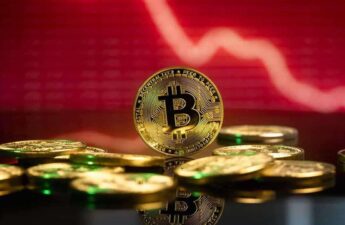SUI, the native token of the eponymous proof-of-stake (PoS) blockchain, faced another significant drop over the past 24 hours, plummeting to an all-time low of $0.367 in the early hours on Wednesday.
The altcoin managed to climb back to $0.377 at press time, marking a 5.5% drop in value on the day. SUI is down 8.7% over the past week, according to CoinGecko.
Launched in May this year, the Sui blockchain is billed as “a first-of-its-kind Layer 1 blockchain and smart contract platform designed from the bottom up to make digital asset ownership fast, private, secure, and accessible to everyone.”
The SUI token is used to pay gas fees for transactions, staking, and governing the network. According to the Foundation, half the supply of the tokens, which is capped at 10 billion, are allocated to the Community Reserve—a fund managed by the Sui Foundation, with the rest of the token distributed among early contributors, investors, the network’s principal developer Mystem Labs, as well as the Community Access Program.
The downward spiral comes amid reports that the Sui Foundation allegedly manipulated the SUI token supply. The Sui Foundation refuted the accusations in a statement to Decrypt, with a spokesperson describing them as “unfounded and materially false statements surrounding the supply of SUI tokens.” They added that, “Contrary to recent conjecture, there has never been any sale of SUI tokens by the Foundation after the initial Community Access Program (CAP) distributions.”
Representative Min Byeong-deok of the Democratic Party of Korea on Tuesday alleged that the Sui Foundation exploited locked-up Sui coin reserves through staking to generate profits, all the while flooding the market with more coins to inflate its circulating supply.
Pointing to the fact that the price of SUI fell 67.1% in five months after listings on major local exchanges, Min also slammed the Digital Asset eXchange Alliance (DAXA) for not taking any action to address the price decline, which caused “lot of investor dissatisfaction.” He compared the consultative body’s failure to take any measures to “leaving the fish to the cat.”
“The main reason for the drop in Sui prices is the distribution issue, but DAXA is not taking action,” said Min. “The Sui Foundation paid self-interest by staking coins that should have been uncirculated.”
The official further alleged that the Sui Foundation paid self-interest by staking coins that shouldn’t have been in circulation, selling the coins received as interest on the market.” Citing a report by Hansung University Professor Cho Jae-woo, an advisory member of DAXA, Min said that the Foundation’s profits received as interest amount to as much as $2.8 million.
The South Korean Financial Supervisory Service (FSS) chairman Lee Bok-hyun indicated that should the allegations of manipulation of distribution volume through staking or unfair disclosure be confirmed, the regulator will have DAXA inspect it.
The FSS has yet to respond to Decrypt’s request for comment at the time of this writing.
SUI circulating supply schedule ‘accurate,’ says Foundation
The Sui Foundation—an independent organization dedicated to the adoption of the Sui network— further shared with Decrypt that the circulating supply schedule of the SUI token, which is displayed on its website and available through the public APIs, “is accurate.”
“Sui Foundation has never liquidated any SUI tokens including staking rewards other than as set forth above,” said the spokesperson, while also highlighting that the Sui blockchain was developed by technology leaders from Meta, who were previously responsible for the Libra Blockchain and Move Programming language.
“These are some of the most respected technologists in the fields of distributed systems, programming languages and cryptography,” added the spokesperson for the Sui Foundation.
The news comes as South Korea, sometimes called the hotbed of crypto in Asia due to the strong popularity of cryptocurrencies in the country, has been actively working to regulate the cryptocurrency market to ensure the safety and security of investors and to prevent illegal activities, following the collapse of the Terra ecosystem last year.



